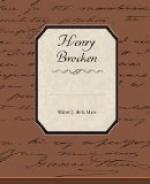I must indeed have been exhausted to chop logic with a water-witch. As well argue with minnows, entreat the rustling of ivy-leaves. It was Rosinante, wearying, I suppose, of the reflection of her own mild countenance, that drew me back from dream and disaster. She turned with arched neck seeking a more wholesome pasture than these deep mosses.
Leaving her then to her own devices, and yet hearkening after the voice of the charmer, I came out again into the garden, and perceived before me a dark palace with one lofty tower.
It seemed strange I had not seen the tower at my first coming into this wilderness. It stood with clustered summit and stooping gargoyles, appealing as it were to fear, in utter silence.
Though I knew it must be day, there was scarcely more than a green twilight around me, ever deepening, until at last I could but dimly discern the upper windows of the palace, and all sound waned but the roar of distant falling water.
Then it was I found that I was not alone in the garden. Two little leaden children stood in an attitude of listening on either side of the carved porch of the palace, and between them a figure that seemed to be watching me intently.
I looked and looked again—saw the green-grey folds, the tawny locks, the mistletoe, the unearthly eyes of this unstirring figure, yet, when I advanced but one strenuous pace, saw nought—only the little leaden boys and the porch between them.
These childish listeners, the straggling briers, the impenetrable thickets, the emerald gloaming, the marble stillness of the lofty lichenous tower: I took courage. Could such things be in else than Elfland? And she who out of beauty and being vanishes and eludes, what else could she be than one of Elfland’s denizens from whom a light and credulous heart need fear nothing.
I trod like a shadow where the phantom had stood and opened the unused door. I was about to pass into the deeper gloom of the house when a hound appeared and stood regarding me with shining eyes in the faint gloaming. He was presently joined by one as light-footed, but milk-white and slimmer, and both turned their heads as if in question of their master, who had followed close behind them.
This personage, because of the gloom, or the better to observe the intruder on his solitude, carried a lantern whose beams were reflected upon himself, attired as he was from head to foot in the palest primrose, but with a countenance yet paler.
There was no hint of enmity or alarm or astonishment in the colourless eyes that were fixed composedly on mine, nothing but courtesy in his low voice.
“Back, Safte!—back, Sallow!” he cried softly to his hounds; “is this your civility? Indeed, sir,” he continued to me, “it was all I could do to dissuade the creatures from giving tongue when you first appeared on the terrace of my solitary gardens. I heard too the water-sprite: she only sings when footsteps stray upon the banks.” He smiled wanly, and his nose seemed even sharper in his pale face, and his yellow hair leaner about his shoulders. “I feared her voice might prove too persuasive, and deprive me of the first strange face I have seen these many decades gone.”




